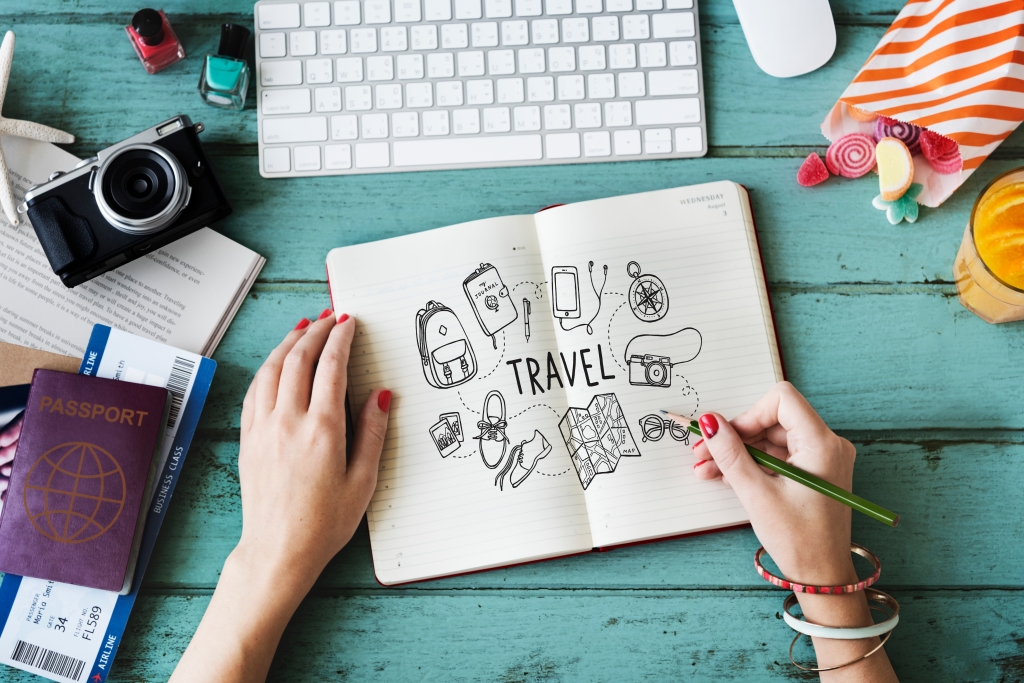
1. Solo vs. Group Budget Travel
When it comes to budget travel, the choice between going solo or traveling with a group is a pivotal decision. Both options have their merits, and understanding the pros and cons can help you make the right choice for your circumstances.
Solo Budget Travel:
Pros:
- Freedom and Flexibility: Traveling solo means you have complete control over your itinerary. You can change plans on a whim and follow your own interests.
- Lower Costs: You have the ability to minimize expenses by choosing the most budget-friendly options for accommodation, dining, and transportation.
- Personal Growth: Solo travel often leads to self-discovery and personal growth, as you navigate unfamiliar territories independently.
- Enhanced Cultural Immersion: Traveling alone can encourage deeper interactions with locals and a more immersive cultural experience.
Cons:
- Loneliness: Solo travel can be lonely at times, especially during long journeys. Sharing experiences with others is not as straightforward.
- Safety Concerns: There may be safety concerns when you’re on your own. Staying vigilant and taking precautions is essential.
- Higher Individual Costs: Some costs, like accommodation, may not be significantly lower when traveling alone compared to sharing with others.
Group Budget Travel:
Pros:
- Shared Expenses: Traveling with a group allows you to split costs for accommodations, transportation, and even food, resulting in significant savings.
- Companionship: Group travel provides companionship, reducing feelings of loneliness, and offering a support system during challenging situations.
- Safety in Numbers: Groups can be more secure, especially in unfamiliar or potentially risky locations.
- Shared Responsibilities: Tasks like planning, navigating, and decision-making can be shared among group members.
Cons:
- Limited Flexibility: Group travel often requires compromise on itineraries and activities to accommodate different preferences.
- Potential Conflicts: Differences in opinions, personalities, or expectations can lead to conflicts within the group.
- Less Intimate Experiences: Traveling with a group may limit your interactions with locals and hinder personal growth opportunities.
2. Traveling with Kids on a Budget
Family vacations are a wonderful way to create lasting memories, even on a tight budget. Here are some practical tips for traveling with kids while keeping expenses in check:
Tips:
- Plan Ahead: Research and plan your trip well in advance to secure the best deals on accommodation and transportation.
- Budget-Friendly Destinations: Choose destinations known for their family-friendly attractions and budget options. National parks, camping sites, and beach towns often fit the bill.
- Flexible Dates: Be open to flexible travel dates, as mid-week or off-peak travel can lead to more affordable rates.
- Pack Light: Traveling with less luggage not only saves on baggage fees but also makes navigating airports and public transport easier.
- Utilize Loyalty Programs: If you have frequent flyer miles or hotel loyalty points, now’s the time to use them for family travel.
- Self-Catering Accommodation: Opt for accommodations with kitchen facilities to prepare some meals, reducing dining costs.
- Free and Low-Cost Activities: Research local free or low-cost attractions, parks, and museums suitable for children.
- Travel During Off-Peak Hours: Avoid traveling during rush hours to save on transportation costs.
- Group Discounts: Take advantage of group discounts for family admission to attractions and activities.
- Plan Rest Time: Children need downtime, so schedule breaks during the day to prevent overexertion
3. Tips on How to Keep Things Cheap or Free
When traveling on a budget, being resourceful and finding ways to minimize expenses is key. Here are practical tips on how to keep your travel costs low or even enjoy some aspects of your journey for free:
Accommodation:
- Hostels and Guesthouses: Consider staying in budget-friendly hostels or guesthouses, which often offer dormitory-style rooms at a fraction of hotel prices.
- Camping: If you’re an outdoor enthusiast, camping can be an incredibly cost-effective way to enjoy nature and save on accommodation costs.
- Couchsurfing: Explore the Couchsurfing community to find locals willing to host travelers for free, providing a unique cultural exchange opportunity.
Dining:
- Street Food: Opt for street food and local markets to savor authentic cuisine at a fraction of restaurant prices.
- Picnics: Pack your own meals and have picnics in parks or scenic spots. This not only saves money but also offers a delightful dining experience.
- BYOB: When dining out, look for restaurants that allow you to bring your own beverages to save on costly drinks.
Transportation:
- Public Transportation: Utilize public transportation like buses, trams, and subways, which is often more affordable than taxis or private transfers.
- Walk and Cycle: Explore your destination on foot or rent a bike to save on transportation costs and immerse yourself in the local culture.
Sightseeing and Activities:
- Free Attractions: Research free or low-cost attractions, museums, and cultural sites in your destination.
- Guided Walking Tours: Many cities offer free guided walking tours, where you can explore the city with knowledgeable guides and pay what you can afford as a tip.
- Outdoor Adventures: Embrace outdoor activities like hiking, swimming, or simply enjoying nature, which often come with no or minimal costs.
Travel Insurance:
- Compare Quotes: Don’t skimp on travel insurance, but do compare quotes from various providers to find affordable coverage that suits your needs.
4. Volunteer and Work Exchange Programs
Engaging in volunteer and work exchange programs can be an excellent way to offset travel expenses while making a positive impact in your host community. Here’s how you can get involved:
Volunteering:
- Research Opportunities: Look for volunteer organizations and projects that align with your interests and skills.
- Duration: Choose programs with flexible durations, allowing you to balance volunteering with exploring your destination.
- Accommodation and Meals: Many volunteer programs provide free or low-cost accommodation and meals in exchange for your time and efforts.
Work Exchange:
- Platforms: Explore websites like Workaway, HelpX, and WWOOF (World Wide Opportunities on Organic Farms) to find work exchange opportunities worldwide.
- Skills: Highlight your skills, whether it’s farming, teaching, cooking, or construction, to find suitable placements.
- Cultural Exchange: Work exchange programs offer a unique chance to immerse yourself in local culture and gain authentic experiences.
5. How to Make Money While Traveling
While traveling, it’s possible to earn money to sustain your journey. Here are some avenues to consider:
Freelancing and Remote Work:
- Online Freelancing: Utilize platforms like Upwork, Freelancer, or Fiverr to offer your skills remotely.
- Telecommuting: If your job allows, negotiate with your employer for the option to work remotely while traveling.
Seasonal Work:
- Resorts and Ski Destinations: Many ski resorts hire seasonal staff during the winter season for jobs like skiing instructors, lift operators, and hospitality roles.
- Farming and Agriculture: Explore opportunities to work on farms during planting and harvesting seasons, often offering room and board in exchange for labor.
- Festivals and Events: Some events and festivals hire temporary staff for tasks such as ticketing, security, and event management.
Digital Nomad Jobs:
- Blogging and Content Creation: If you have a passion for writing or photography, consider starting a travel blog or freelancing as a content creator.
- Online Teaching: Platforms like VIPKid and iTalki offer opportunities to teach English online to students around the world.
- Consulting: Offer consulting services in your field of expertise to clients online.
By tapping into these income-generating opportunities, you can prolong your travels, cover expenses, and make your journey more financially sustainable.
6. Harnessing Reward and Cashback Cards
Using reward and cashback cards can be a savvy strategy to make your budget travel more economical. Here’s how to make the most of these financial tools:
Choosing the Right Card:
- Research: Begin by researching different credit cards that offer travel rewards or cashback benefits. Look for cards that align with your spending habits and travel goals.
- Annual Fees: Consider whether the card’s annual fee is justified by the rewards or cashback you can earn.
Accumulating Points or Cashback:
- Everyday Spending: Use your reward or cashback card for everyday expenses like groceries, dining, and gas to accumulate points or cashback.
- Bonus Categories: Take advantage of cards that offer extra rewards in specific spending categories such as travel, dining, or shopping.
- Sign-Up Bonuses: Look for cards that offer generous sign-up bonuses when you meet a minimum spending requirement within a specified time frame.
Redeeming Rewards:
- Travel Partners: Many reward programs have partnerships with airlines, hotels, and rental car companies, allowing you to redeem points for travel-related expenses.
- Cashback Options: If you have a cashback card, consider using the cashback for travel expenses like flights or accommodations.
Additional Benefits:
- Travel Insurance: Some reward cards offer travel insurance, including coverage for trip cancellations, lost luggage, and rental car accidents.
- Airport Lounge Access: Premium reward cards often provide access to airport lounges, which can enhance your travel experience.
7. Budget Travel Safety
Maintaining safety while traveling on a budget is paramount. Here are essential safety tips:
Research Your Destination:
- Safety Assessment: Research your destination’s safety by reading travel advisories, forums, and blogs.
- Local Laws: Familiarize yourself with local laws and customs to avoid inadvertently breaking any rules.
Secure Your Finances:
- Money Belts and Pouches: Use money belts or pouches to keep your valuables concealed and secure while exploring.
- Emergency Funds: Carry a small amount of emergency cash in a separate location in case your wallet is lost or stolen.
Stay Connected:
- Local SIM Cards: Purchase a local SIM card or an international data plan to stay connected and access maps and emergency information.
- Communication: Share your itinerary and contact details with a trusted friend or family member.
Be Aware of Scams:
- Tourist Scams: Educate yourself about common tourist scams in your destination, and be cautious of overly friendly strangers.
- Pickpocketing: Be vigilant in crowded areas and keep a close eye on your belongings.
Accommodation Safety:
- Lock Doors and Windows: Secure your accommodation by locking doors and windows, and use the provided safes for valuables.
- Research Neighborhoods: Choose accommodations in safe neighborhoods, and read reviews for insights from other travelers.
8. Short-Term Budget Travel
Short-term budget travel is all about maximizing your experiences in a limited time frame. Here’s how to make the most of your short getaways:
Prioritize Must-See Attractions:
- Create a List: Identify the top attractions and experiences you want to enjoy during your short stay.
- Efficient Planning: Plan your itinerary strategically to minimize travel time between attractions.
Opt for Central Accommodation:
- Location Matters: Choose accommodations in central areas to reduce transit time and maximize exploration time.
- Walking Tours: Participate in guided walking tours to cover significant sights efficiently.
Travel Light:
- Minimal Packing: Pack only essential items to avoid baggage fees and save time at airports.
- Layered Clothing: Pack versatile clothing that can be layered for varying weather conditions.
Use Public Transportation:
- Transit Passes: Invest in transit passes for the duration of your stay, as they often provide cost-effective transportation.
9. Long-Term Budget Travel
Long-term budget travel requires careful planning and financial management. Here’s how to embark on an extended journey without overspending:
Budget Planning:
- Create a Detailed Budget: Outline all expected expenses, including accommodation, food, transportation, and activities.
- Emergency Fund: Set aside an emergency fund to cover unexpected expenses like medical bills or travel disruptions.
Slow Travel:
- Extended Stays: Consider staying in a destination for a longer period to benefit from lower monthly accommodation rates.
- Local Experiences: Immerse yourself in local culture by participating in community events, festivals, and classes.
Income Sources:
- Remote Work: If possible, secure remote work opportunities to supplement your travel funds.
- Freelancing: Freelance or offer services in your field of expertise online.
Travel Insurance:
- Comprehensive Coverage: Invest in comprehensive travel insurance to protect yourself against unforeseen events.
- Review Policy: Carefully review your insurance policy to understand coverage limitations and requirements.
10. Budget-Friendly Locations with Work Options
Choosing destinations that offer work opportunities can extend your travels. Here are some budget-friendly locations to consider:
Southeast Asia:
- Thailand: Known for its affordability, Thailand offers various job opportunities for travelers, such as teaching English and seasonal work.
- Vietnam: Vietnam’s low cost of living makes it appealing for long-term stays, with jobs in education and tourism.
South America:
- Colombia: Colombia offers a favorable exchange rate and opportunities for teaching, remote work, and agricultural jobs.
- Peru: With its diverse landscapes, Peru is ideal for work exchange programs, including farming and volunteering.
Eastern Europe:
- Poland: Affordable living costs and an array of job prospects, especially in major cities like Warsaw and Krakow.
- Czech Republic: Opportunities in English teaching, tourism, and tech industries in cities like Prague.
Digital Nomad Hubs:
- Bali, Indonesia: A hotspot for remote workers and digital nomads, Bali provides a relaxed lifestyle and co-working spaces.
- Chiang Mai, Thailand: Known for its affordability and a thriving community of digital nomads.
By choosing destinations where you can work or volunteer, you can prolong your travels and immerse yourself in local culture while staying within your budget.
11. Overcoming Budget Travel Challenges
While budget travel can be rewarding, it also comes with its fair share of challenges. Here’s how to tackle common obstacles that budget travelers may encounter:
Unexpected Expenses:
- Emergency Fund: Build and maintain an emergency fund to cover unexpected costs like medical emergencies or last-minute transportation changes.
- Travel Insurance: Invest in comprehensive travel insurance that includes coverage for cancellations, medical emergencies, and lost belongings.
Language Barriers:
- Learn Basic Phrases: Even a few basic phrases in the local language can go a long way in communication and building rapport with locals.
- Translation Apps: Use translation apps to bridge language gaps and navigate local situations.
Accommodation Availability:
- Book in Advance: Secure accommodations ahead of time, especially during peak travel seasons, to ensure availability and favorable rates.
- Flexible Plans: Maintain some flexibility in your itinerary to adapt to unexpected changes in accommodations.
Currency Exchange:
- ATMs: Use ATMs to withdraw local currency as needed, rather than exchanging large amounts at unfavorable rates.
- Local Currency: Whenever possible, use local currency for transactions to avoid additional exchange fees.
Transportation Hiccups:
- Travel Apps: Download transportation apps like Google Maps or local transit apps to navigate public transportation easily.
- Plan for Delays: Expect transportation delays and factor them into your schedule, allowing for buffer time between connections.
12. Student Discounts When Traveling
If you’re a student, taking advantage of student discounts while traveling can significantly reduce expenses. Here’s how to access these discounts:
Student Identification:
- International Student ID Card (ISIC): Obtain an ISIC, a globally recognized student identification card that offers discounts on transportation, accommodations, and attractions.
- University ID: Carry your university or college ID card as some places may offer student discounts without an ISIC.
Research Discounts:
- Online Resources: Use websites and apps dedicated to listing student discounts, such as StudentUniverse, Student Beans, or Youth Hostel Association (YHA) memberships.
- Inquire Locally: Ask at ticket counters, museums, and restaurants if they offer student discounts, as some places may not advertise them.
Utilize Youth Hostels:
- Hostel Discounts: Many hostels around the world offer reduced rates for travelers under 26 or those with valid student IDs.
- Membership Cards: Consider purchasing a YHA or Hostelling International membership card for additional savings.
13. How to Plan a Budget Trip
Planning a budget trip requires careful consideration and organization. Here’s a step-by-step guide to help you plan an economical and enjoyable journey:
Set a Budget:
- Determine Your Total Budget: Calculate the total amount you’re willing to spend on your trip, including transportation, accommodation, food, activities, and a contingency fund.
- Allocate Funds: Break down your budget into specific categories to see where you can allocate more or less money based on your priorities.
Choose Your Destination:
- Research Destinations: Consider destinations known for being budget-friendly. Research visa requirements, safety, and local costs.
- Off-Peak Travel: Opt for off-peak seasons to enjoy lower prices on accommodation and activities.
Accommodation and Transportation:
- Booking Early: Secure budget-friendly accommodations and transportation options in advance to secure the best deals.
- Comparative Pricing: Compare prices for flights, buses, trains, and accommodations on various platforms to find the most economical options.
Food and Dining:
- Local Cuisine: Embrace local cuisine, including street food and local markets, to enjoy authentic flavors at lower prices.
- Cooking: If possible, book accommodations with kitchen facilities to prepare your meals, saving on dining costs.
Activities and Sightseeing:
- Prioritize Attractions: Create a list of must-see attractions and prioritize them to ensure you don’t miss out on the most important experiences.
- Free and Low-Cost Activities: Research free or low-cost activities and attractions in your destination to fill your itinerary.
Emergency Funds and Insurance:
- Emergency Fund: Set aside an emergency fund for unexpected expenses.
- Travel Insurance: Purchase comprehensive travel insurance to safeguard against unforeseen circumstances.
Pack Light and Smart:
- Essential Packing: Pack only essential items, versatile clothing, and travel-sized toiletries to minimize baggage fees and maximize convenience.
- Travel Accessories: Bring practical travel accessories like a power bank, universal adapter, and a reusable water bottle.
Enjoy the Journey:
- Flexibility: Stay open to changing plans and adapting to unexpected opportunities or challenges.
- Local Experiences: Immerse yourself in local culture by engaging with locals and participating in community events.





Leave a comment